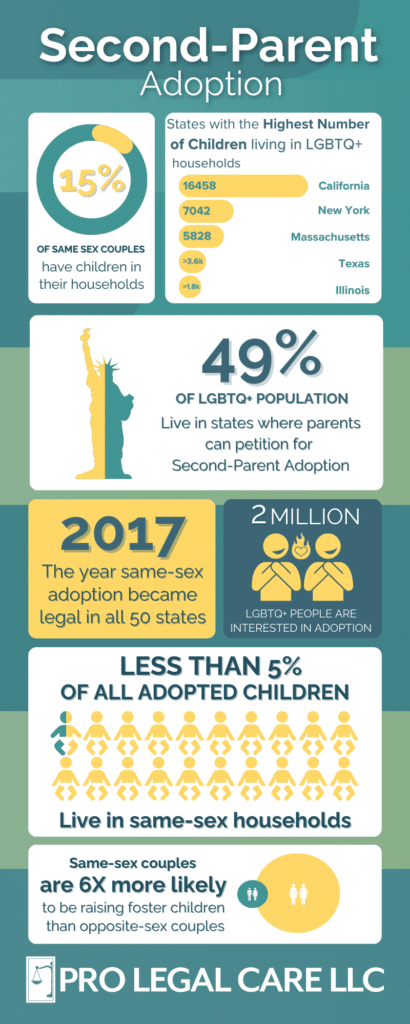
For non-biological parents in LGBTQ+ families, second parent adoption, also known as co-parent adoption or confirmatory adoption, is a legal process that helps protect parental rights regardless of what state the family may live in or travel to in the future, especially if laws that have been passed previously to protect LGBTQ+ families are challenged or repealed. This guide from Illinois Adoption Attorney Zach Townsend will walk you through the process, help you navigate the potential legal complications, understand the financial implications, and find the emotional and social support you need to make your parentage legal and secure.
Quick Answers
- Just because your parent-child relationship is recognized in one context does not mean that it always will be recognized in that context or even that it would be currently recognized in a different context.
- Second parent adoption is a legal process that grants non-biological parents parental rights and responsibilities. Your parent-child relationship may not be secure without a second parent adoption. Having a second parent adoption is like insurance. You do not want to need it, but having it is necessary for your own protection.
- Not having a second parent adoption means that your parent-child relationship can come under attack in the event the other parent dies or if you and your partner are no longer together.
- Varying state and federal laws, eligibility criteria, and financial considerations are important to understand when navigating the process.
- If your child has the same last name as you, that does not necessarily mean that any legal relationship exists.

Understanding Second Parent Adoption
Second parent adoption is a lifeline for non biological parents in LGBTQ+ families, as it gives them full parental rights. This is more than just a legal formality, it’s a recognition of the love, care and dedication these parents put into their children, regardless of biology.
Second parent adoption is a common path for non biological parents but it’s not the only one. Depending on the makeup of a family, stepparent adoption is also an option for non biological parents who want to secure their legal rights and secure their parentage.
Why Second Parent Adoption Matters
Second parent adoption provides a legal seal to the parental relationship between a non-birth parent and a child, empowering them with the authority to make pivotal decisions on behalf of the child in various settings, from schools to hospitals. Without this legal recognition, non-biological parents may find themselves powerless in situations where their parental authority is questioned or outright denied, especially when there is already a dispute or another problem that exists.
Beyond its legal necessity, it also affirms the role of the non-biological parent in the child’s life. It reassures the child that their non-biological parent has the same rights and responsibilities as their biological parent, fostering a sense of security and stability. From the same sex parent adoption process in Illinois to the rights granted by the Full Faith and Credit Clause of the Constitution, every aspect of second parent adoption is aimed at protecting the interests of the child and the non-biological parent.
Differences Between Second Parent, Co-Parent, and Stepparent Adoption
Within the adoption context, second parent, co-parent, and stepparent adoption are often mentioned simultaneously. However, each carries its own unique implications and requirements. Second parent adoption, also known as co-parent adoption, is the most common route for same sex couples, particularly LGBTQ+ non-biological parents seeking legal rights over their children. It allows a non-biological parent to adopt the child without disrupting the legal rights of the biological parent.
In contrast, stepparent adoption involves a spouse adopting their partner’s biological child, usually in a heterosexual context. While both second parent and stepparent adoption aim to legally establish the non-biological parent’s rights, they cater to different familial structures and are governed by different laws and regulations. Understanding these differences is important in selecting the right adoption process for your family.
State-by-State Overview of Second Parent Adoption Laws
In the United States, adoption laws vary from state to state, with each state having the power to shape its own laws. From states that welcome second parent adoption with open arms to those that put up legal roadblocks, there is a lot of variation from state to state.
States with Favorable Laws
Some states stand as beacons of hope for non-biological parents seeking to legally establish their parental rights. Alabama, Illinois, and Vermont are a few examples of states that tend to have laws favorable to second parent adoption. In these states, non-biological parents can adopt their partner’s child without terminating the biological parent’s rights, creating a legally recognized family unit.
California, New York, and Massachusetts, among others, also have favorable laws that allow for second parent adoption. These states not only permit this form of adoption but also ensure that the non-biological parents obtain the same rights and responsibilities as the biological parents. The legal protections offered in these states provide a strong foundation for non-biological parents seeking to adopt.
States with Restrictive Laws
While some states provide a conducive legal environment for LGBTQ+ families, others present significant barriers. Here are some states with restrictive laws that make second parent adoption a more challenging process:
- Alabama
- Florida
- Utah
- Mississippi
Adoption laws often reflect societal biases and outdated views on family structures, often creating legal obstacles for non-biological parents seeking to adopt.
These restrictive laws can impose various limitations, including a prohibition on unmarried parents from petitioning for adoption and age restrictions for adoptive parents and other barriers. Despite these challenges, it’s crucial to remember that legal hurdles can be overcome with the right strategies and the assistance of experienced legal counsel.
Eligibility Criteria and Legal Requirements
Like any adoption process, second parent adoption has its own eligibility criteria and legal requirements. Factors such as marital status, residency, and consent from the current legal parent can all play a role in determining eligibility.
Marital status, for instance, can significantly impact the rights and eligibility of a non-biological parent in second parent adoption. Similarly, residency status can influence eligibility, with some states requiring the petitioner to be a U.S. citizen or a lawful permanent resident. Each case and the outcome achieved can depend on these factors and their implications for second parent adoption.
Marital Status and Residency
Marital status and residency are two crucial factors in determining eligibility. Some states require parents to be legally married for second parent adoption, while others do not consider marital status a factor. In the state of Illinois, for example, both married and unmarried partners are eligible for second parent adoption.
Residency status can also play a significant role in determining eligibility. In some states, the petitioner must be a U.S. citizen or a lawful permanent resident. There may also be age requirements for the adoptive parent and cohabitation requirements for the child and the adoptive parent. Understanding these requirements is key to a successful adoption process.
Consent from Current Legal Parent
Securing the consent of the current legal parent is another crucial aspect of second parent adoption. This requirement ensures all parties involved are aware of and agree with the adoption proceedings. It acknowledges that adoption grants both parents, regardless of their biological relationship to the child, legal custody rights over the child.
The significance of this consent cannot be overstated. Without it, the adoption process may be stalled or even halted. In cases where the biological parent opposes the adoption and refuses to provide consent, the adoption may become contested, requiring the court to step in and make a ruling based on the best interests of the child over the objection of the biological parent.
Benefits of Second Parent Adoption for LGBTQ+ Families
LGBTQ+ families stand to gain substantially from the process of second parent adoption. By undertaking this legal procedure, non-biological parents receive vital rights and protections that allow them to be completely engaged in their child’s upbringing. The range of advantages encompasses not only emotional stability for the family, but also access to essential federal benefits and legal safeguards, enhancing the well-being of LGBTQ+ families through second parent adoption.
Legal Security for Non-Biological Parents
The process of adoption is crucial for safeguarding the parental rights of a non-biological co-parent. By securing an official adoption order, this parent is granted legal recognition, which precludes potential disputes over custody in different situations. Such measures guarantee that both parents have equal authority to determine their child’s well-being without facing legal obstacles due to the absence of a biological relationship.
By pursuing second-parent adoption, non-biological parents can fortify their parental claims and avoid future challenges regarding custody matters or the lawfulness of the parent-child relationship. This formal acknowledgment through adoption proceedings solidifies the relationship between the parent and child legally, offering advantages to all family members involved. The establishment of unequivocal parental rights via this route ensures lasting familial harmony and reassurance for everyone concerned.
Access to Federal Benefits and Resources
Through legal adoption, families gain entitlement to various state and federal benefits. Such recognition enables adoptive parents to procure health insurance benefits for their child. Legally acknowledged parents are granted inheritance rights, assuring financial protection for their children. These crucial state and federal advantages and resources play an essential role in securing the enduring welfare of both the child and family. The formal acknowledgment of parentage is key in safeguarding these significant benefits.
Emotional and Social Stability
Having two dedicated parents can provide a more secure and supportive environment that is nurturing for the child. When both parents have legal recognition, it bolsters the stability and security within the family structure, which in turn fosters emotional wellbeing by giving children a solid sense of belonging.
The enhanced sense of emotional safety and increased feeling of inclusion that come from having legally recognized guardians is critical to their overall growth and health. The formal acknowledgement of parenthood contributes significantly to shaping an environment where love and support thrive for the benefit of the child’s upbringing.
Common Situations Requiring Second Parent Adoption
In the context of forming their families, same-sex couples frequently consider their options while anticipating a child, during pregnancy, or after the birth. Circumstances that often necessitate this process for these families include those involving assisted reproduction and surrogacy as well as instances when blending existing family units. This step is crucial for solidifying both parents’ legal status to safeguard both the stability and welfare of the child by locking in your parent-child relationship.
The Second Parent Adoption Process
With an understanding of the legal landscape and the eligibility criteria, it’s time to begin the second parent adoption process. From finding an attorney to conducting a home study and finalizing the adoption or a Guardian ad Litem’s investigation, each step brings you closer to legal parenthood.
An experienced attorney can provide invaluable support during this process, ensuring that you meet all legal requirements and guiding you through potential challenges, both legal and logistical. Similarly, a home study and background checks can provide a solid foundation for your adoption petition. Going through these steps in detail, helping you recognize administrative documents that are essential for a successful adoption, and the jurisdictional requirements are all going to depend on the case.
Finding an Attorney
The initial step in the second parent adoption process is securing an attorney. This legal ally can make all the difference in your adoption journey, providing guidance, advice, and advocacy. When searching for an attorney, consider their qualifications and experience in adoption law, their familiarity with your state’s laws, and their ability to clearly explain the process.
Selecting an attorney who is not only experienced but also LGBTQ+ friendly is helpful. Your attorney should be able to handle the necessary paperwork, represent you in court proceedings, and protect your best interests and those of your child. Recommendations from other adoptive families or LGBTQ+ organizations can be invaluable in finding the right attorney for your case.
Home Study and Background Checks
Following the appointment of an attorney, the next step in the second parent adoption process is the home study or Guardian ad Litem investigation. This comprehensive evaluation assesses the readiness and suitability of the prospective adoptive parent and their home environment. It can involve:
- Possible home visit
- A physical assessment
- Meeting with minor child
- Investigation of Guardian ad Litem
- Background checks and fingerprinting
- Interviews and investigations
- Visits by social workers or caseworkers
The home study is an element of the adoption process, providing a holistic view of the prospective adoptive parent’s ability to provide a safe and nurturing environment for the child. While it may take several weeks or even months to complete, it’s a crucial step towards finalizing the adoption. The investigation of a Court appointed Guardian ad Litem may occur in addition to or in place of the home study, depending on the state in which the second parent adoption is occurring.
Finalizing the Adoption
With the home study complete and the necessary documents gathered, it’s time to finalize the adoption. This step involves filing an adoption petition, obtaining a court order, and securing a decree of adoption. It’s during this stage that the judge issues the adoption order and signs the decree, effectively finalizing the adoption.
Financial Considerations and Support
Although the joy of becoming a parent through second parent adoption is invaluable, the process does carry a financial burden. The costs of second parent adoption can include:
- Legal fees
- Home study costs
- Guardian ad Litem fees
- Court filing fees
- Birth Certificate Amendment fees
With regard to these financial aspects, you will need to speak with an attorney in your area to obtain a detailed breakdown of the estimated costs specific to your state and county.
Summary
In conclusion, second parent adoption is a powerful legal tool that allows non-biological parents in LGBTQ+ families to fully protect their parental rights as laws on the state and federal level may change.

Schedule a Consultation with Adoption Attorney Zachary Townsend
Call or text today – (815) 200-8802
Frequently Asked Questions
What are the benefits of second-parent adoption?
Second parent adoption grants both parents equal parental rights, such as the right to make decisions about their child’s well-being, and equal responsibilities. Additionally, it protects both the child and parent in case of death or separation, ensuring that the child will continue to have a relationship with both parents regardless of what the future holds.
Is second-parent adoption necessary in Illinois?
Second-parent adoption is not a legal requirement in Illinois, however professionals recommend it as a safeguard against potential issues when visiting other states and for security to prevent other possible unexpected future problems. To avoid potential risks, a second parent adoption is absolutely necessary to legally secure the parent-child relationship when the second parent does not share a biological relationship with the child.
What is second parent adoption?
Second parent adoption is a legal process that allows a non-biological parent in an LGBTQ+ family to adopt their partner’s child, granting them full parental rights and legal recognition as a parent.
What is the difference between second parent, co-parent, and stepparent adoption?
Second parent adoption allows non-biological parents to secure parental rights and is sometimes called co-parent adoption, and stepparent adoption occurs when one parent remarries and their spouse adopts the child.
What are the eligibility criteria for second parent adoption?
Eligibility for second parent adoption typically requires that the parties and child have residency in the relevant state or county, that the Court have jurisdiction to hear the matter, that all of the parties living together for a certain period of time, obtaining consent from the current legal parent, and a finding that the adoption would be in the best interests of the child.


